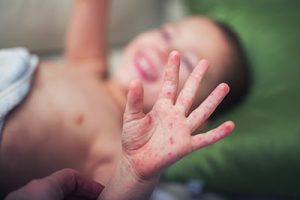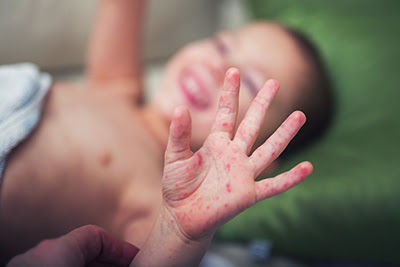HFMD in Childcare Centres: What Should Parents Know?
Contributed by: Kids Clinic

If you are a parent of toddlers or children soon entering childcare, you would likely have heard of Hand, Foot Mouth Disease (HFMD). Outbreaks of HFMD are common all year round in childcare centres and kindergartens across Singapore.
As parents, what should you be aware of before sending your child off to childcare?
Why do Kids in Childcare Get Sick More Easily?
Infectious diseases tend to be common among young children, and childcare settings (e.g. infant care, nursery, kindergarten) are a hotbed for the spread of such diseases. In fact, young children in childcare settings are 2-3 times more likely to fall ill. This is because young children have yet to be exposed to numerous common germs, which means that their bodies have no immunity or resistance against these germs yet. Close contact between children for prolonged periods also increases exposure to these contagious diseases. In addition, young children are more likely to spread germs when they put their fingers, toys and other objects into their mouths.What is Hand Foot Mouth Disease (HFMD)?

HFMD usually occurs in children under 10 years old and usually lasts between up to 7 to 10 days. The illness has an incubation period of 3 to 7 days from when a child is infected to when symptoms show.

Symptoms include:
- Fever
- Lethargy
- Sore throat and/or drooling
- Painful mouth sores located on the throat, gums and inside of cheeks. These are small red spots that blister and often become ulcers.
- Non-itchy rashes on the hands, soles of the feet, buttocks and/or genitalia
HFMD is spread through contact with:
- Nose and throat secretions (saliva, mucus, etc.)
- Fluids from the blisters of an infected person.
- Faeces
Adults can also contract HFMD but the illness is generally milder.
Read our Health Topics A-Z section for more information on Hand Foot Mouth Disease.
What Should I Do if My Child Has HFMD?
While medications for throat and fever can help alleviate symptoms, there is no specific anti-viral treatment for HFMD or vaccination to prevent it. It can take 1 to 2 weeks before your child can return to school, once all the symptoms have cleared up. Sufficient hydration and rest is key to recovery. If possible, isolate your child from family members and the public as HFMD is highly contagious. Practice high standards of personal hygiene and inculcate these habits in your child at all times (regardless of whether your child is infected):- Use soap and water to wash hands before and after eating, as well as after visiting the toilet
- Cover his or her mouth with a tissue when coughing or sneezing
- Do not share utensils, food, drinks, toothbrushes and even towels with others
- Avoid touching the eyes, nose and mouth with unwashed hands
- Regularly disinfect and sterilise toys and other frequently touched surfaces
If your child is showing symptoms of HFMD, consult your doctor first for a thorough examination to make the diagnosis.

